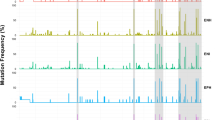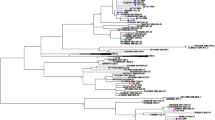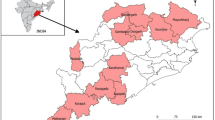Abstract
The objective of this study was to investigate the overall contribution of genetic and environmental effects on poor response to hepatitis B virus (HBV) vaccination in Chinese infants. One-year-old healthy twins were recruited from child-care settings. Parental factors, neonates’ condition at birth, postnatal infant feeding history and growth measurements during the 12 months were investigated by conducting an interview and checking the medical records. HBV-related markers were examined at 1 year of age. Heritability of surface antibody to HBV (anti-HBs) concentrations (ordinal variable) among twins was estimated using MX software. The role of perinatal environmental factors on poor vaccine response (anti-HBs<100 mIU ml−1) was analyzed using XTGEE (fit population-averaged panel-data models by using GEE) programs. Overall, 172 out of 225 recruited twin pairs were analyzed for heritability, including 82 pairs (47.67%) of monozygotic twins and 90 pairs of dizygotic twins, which consisted 43 pairs of (25.0%) opposite sex twins, 29 pairs of male twins and 18 pairs of female twins. Seventy-one (19.9%) of 370 twins showed poor responses to HBV vaccine. An additive genetic (0.91 of the variance)—random environmental (0.09 of the variance)—model best fit the variation of anti-HBs response. Risk factor analysis showed that with a smoking father and low birth weight, the infants were associated with an increased risk of poor response to HBV vaccination (odds ratio (OR)=4.50, 95% confidence interval (CI): 2.52–8.03 and OR=2.55, 95% CI: 1.33–4.87, respectively). Higher Apgar score and gaining more body weight in the first year of life reduced this risk. Genetic factors have a dominant role in determining infant HBV vaccination responses (91%) compared with perinatal environmental factors.
Similar content being viewed by others
Log in or create a free account to read this content
Gain free access to this article, as well as selected content from this journal and more on nature.com
or
References
Beasley, R. P., Hwang, L. Y., Lee, G. C., Lan, C. C., Roan, C. H., Huang, F. Y. et al. Prevention of perinatally transmitted hepatitis B virus infections with hepatitis B virus infections with hepatitis B immune globulin and hepatitis B vaccine. Lancet 2, 1099–1102 (1983).
Arevalo, J. A. & Washington, A. E. Cost-effectiveness of prenatal screening and immunization for hepatitis B virus. JAMA 259, 365–369 (1988).
Van Damme, P., Kane, M. & Meheus, A. Integration of hepatitis B vaccination into national immunisation programmes. Viral. Hepatitis. Prevention. Board. BMJ 314, 1033–1036 (1997).
Roome, A. J., Walsh, S. J., Cartter, M. L. & Hadler, J. L. Hepatitis B vaccine responsiveness in Connecticut public safety personnel. JAMA 270, 2931–2934 (1993).
Rosman, A. S., Basu, P., Galvin, K. & Lieber, C. S. Efficacy of a high and accelerated dose of hepatitis B vaccine in alcoholic patients: a randomized clinical trial. Am. J. Med. 103, 217–222 (1997).
Hohler, T., Reuss, E., Evers, N., Dietrich, E., Rittner, C., Freitag, C. M. et al. Differential genetic determination of immune responsiveness to hepatitis B surface antigen and to hepatitis A virus: a vaccination study in twins. Lancet 360, 991–995 (2002).
Newport, M. J., Goetghebuer, T., Weiss, H. A., Whittle, H., Siegrist, C. A. & Marchant, A. Genetic regulation of immune responses to vaccines in early life. Genes Immun. 5, 122–129 (2004).
Losonsky, G. A., Wasserman, S. S., Stephens, I., Mahoney, F., Armstrong, P., Gumpper, K. et al. Hepatitis B vaccination of premature infants: a reassessment of current recommendations for delayed immunization. Pediatrics 103, E14 (1999).
Neale, M. C., Boker, S. M., Xie, G. & Maes, H. H. Mx: Statistical Modeling, Department of Psychiatry, Virginia Commonwealth University: Richmond, VA, (1999).
Newport, M. J., Goetghebuer, T. & Marchant, A. Hunting for immune response regulatory genes: vaccination studies in infant twins. Expert. Rev. Vaccines 4, 739–746 (2005).
Lau, Y. L., Tam, A. Y., Ng, K. W., Tsoi, N. S., Lam, B., Lam, P. et al. Response of preterm infants to hepatitis B vaccine. J. Pediatr. 121, 962–965 (1992).
Freitas da Motta, M. S., Mussi-Pinhata, M. M., Jorge, S. M., Tachibana Yoshida, C. F. & Sandoval de Souza, C. B. Immunogenicity of hepatitis B vaccine in preterm and full term infants vaccinated within the first week of life. Vaccine 20, 1557–1562 (2002).
Hennig, B. J., Fielding, K., Broxholme, J., Diatta, M., Mendy, M., Moore, C. et al. Host genetic factors and vaccine-induced immunity to hepatitis B virus infection. PLoS One 3, e1898 (2008).
Davila, S., Froeling, F. E., Tan, A., Bonnard, C., Boland, G. J., Snippe, H. et al. New genetic associations detected in a host response study to hepatitis B vaccine. Genes Immun. 11, 232–238 (2010).
Png, E., Thalamuthu, A., Ong, R. T., Snippe, H., Boland, G. J. & Seielstad, M. A genome-wide association study of hepatitis B vaccine response in an Indonesian population reveals multiple independent risk variants in the HLA region. Hum. Mol. Genet. 20, 3893–3898 (2011).
Acknowledgements
We are grateful to the twins and their families for participating this study. We also thank Lihua Yu and Xue Zhang from the Clinical Lab Center of the First Teaching Hospital of Xinjiang Medical University for their assistance in HBV biomarkers examination. We thank all investigators for their contribution in helping complete this study, but who are not listed in the author’s list. This study was supported by the National Science Foundation of China (grant number 30960329) and Intramural funding of Children’s Hospital of Fudan University.
Author information
Authors and Affiliations
Corresponding author
Ethics declarations
Competing interests
The authors declare no conflict of interest.
Rights and permissions
About this article
Cite this article
Yan, K., Cai, W., Cao, F. et al. Genetic effects have a dominant role on poor responses to infant vaccination to hepatitis B virus. J Hum Genet 58, 293–297 (2013). https://doi.org/10.1038/jhg.2013.18
Received:
Revised:
Accepted:
Published:
Issue date:
DOI: https://doi.org/10.1038/jhg.2013.18
Keywords
This article is cited by
-
Anti-HBs levels in children under the age of two years born to HBV carrier mothers after immunoprophylaxis: a multicenter cross-sectional study
BMC Pediatrics (2021)
-
Exploring the molecular causes of hepatitis B virus vaccination response: an approach with epigenomic and transcriptomic data
BMC Medical Genomics (2014)



